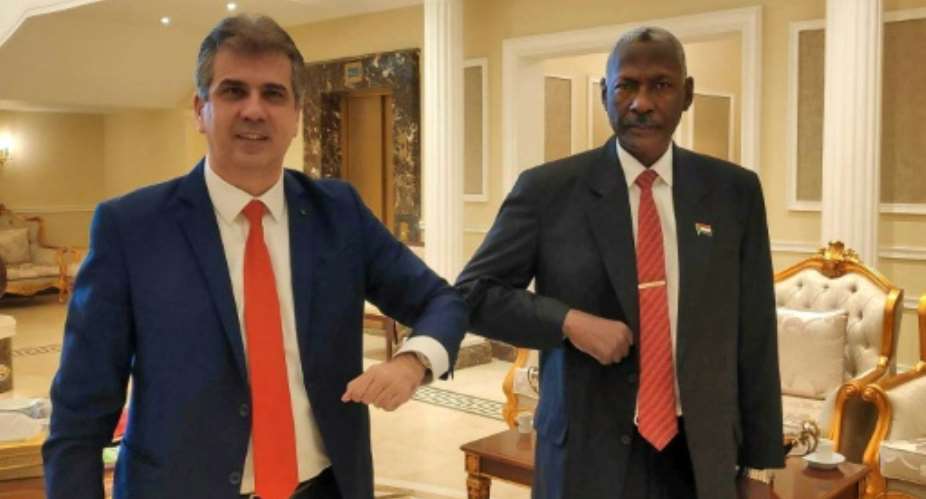Sudan's cabinet approved a bill Tuesday abolishing a 1958 law on boycotting Israel, six months after Khartoum and the Jewish state struck a deal to normalise ties.
"The council of ministers approved a bill repealing the 1958 boycott of Israel law," it said in a statement.
At the same time, it reiterated "Sudan's firm position on the establishment of a Palestinian state within the framework of a two-state solution".
The 1958 law was in line with the policies of Arab nations at the time towards Israel.
Penalties for those who violated its stipulations, such as trading with Israelis, included up to 10 years in jail and a hefty fine.
But the political landscape has changed as Sudan, along with the UAE, Bahrain and Morocco, have struck normalisation deals with Israel mediated by ex-US president Donald Trump's administration.
Sudan agreed to normalise ties with Israel last October, in a quid pro quo for Washington removing the country from its "state sponsors of terrorism" blacklist.
Tuesday's landmark bill will be presented for final approval by Sudan's ruling Sovereign Council, made up of military and civilian figures, before it is passed into law.
'New era'
Up until last year, Egypt and Jordan were the only Arab countries to have recognised Israel, in peace deals struck decades ago.
Other Arab governments refused to normalise relations until Israel reached a comprehensive peace agreement with the Palestinians and its other neighbours.
However, the successive deals -- collectively known as the "Abraham Accords" -- struck over the space of months have already ushered in a "new era" of regional cooperation, in the words of Israeli Prime Minister Benjamin Netanyahu.
Israeli Intelligence Minister Eli Cohen led a delegation to Khartoum in January, marking the first time an Israeli minister visited the African state.
Sudanese state media did not report the visit at the time as public opinion regarding normalisation remains divided.
 A Sudanese demonstrator holds a poster of Jerusalem's Dome of the Rock and the message "Normalisation is a crime" during a rally against the normalisation of ties with Israel on January 17. By ASHRAF SHAZLY (AFP)
A Sudanese demonstrator holds a poster of Jerusalem's Dome of the Rock and the message "Normalisation is a crime" during a rally against the normalisation of ties with Israel on January 17. By ASHRAF SHAZLY (AFP)
In January, dozens of protesters demonstrated outside the cabinet office in Khartoum and burned the Israeli flag.
A month later, Islamist critics lambasted a prominent Sudanese businessman and former lawmaker who hosted an event promoting religious tolerance that included a speech by a rabbi via videoconference.
Khartoum had maintained a rigid anti-Israel stance during the three-decade Islamist rule of former president Omar al-Bashir, who was ousted amid mass protests in 2019.
A post-Bashir transitional government has in stark contrast been pushing for reintegration with the international community and to revive the economy after decades of US sanctions and internal conflict.





 "I can now see clearly with my two eyes, thanks to the generosity of Afenyo-Mark...
"I can now see clearly with my two eyes, thanks to the generosity of Afenyo-Mark...
 Election 2024: Power outages will affect NPP – Political scientist
Election 2024: Power outages will affect NPP – Political scientist
 NPP is 'a laughing stock' for luring 'poster-stickers', 'noisemaking babies' wit...
NPP is 'a laughing stock' for luring 'poster-stickers', 'noisemaking babies' wit...
 Dumsor: Matthew Opoku Prempeh must be removed over power crisis – IES
Dumsor: Matthew Opoku Prempeh must be removed over power crisis – IES
 PAC orders WA East DCE to process requests from their MP
PAC orders WA East DCE to process requests from their MP
 Defectors who ditched Alan’s Movement to rejoin NPP were financially induced – A...
Defectors who ditched Alan’s Movement to rejoin NPP were financially induced – A...
 Dumsor: Akufo-Addo has taken Ghanaians for granted, let’s organise a vigil – Yvo...
Dumsor: Akufo-Addo has taken Ghanaians for granted, let’s organise a vigil – Yvo...
 April 23: Cedi sells at GHS13.66 to $1, GHS13.07 on BoG interbank
April 23: Cedi sells at GHS13.66 to $1, GHS13.07 on BoG interbank
 GRA clarifies tax status of resident individuals earning income abroad
GRA clarifies tax status of resident individuals earning income abroad
 2024 elections: NDC to officially unveil Jane Opoku-Agyemang as running mate tom...
2024 elections: NDC to officially unveil Jane Opoku-Agyemang as running mate tom...
